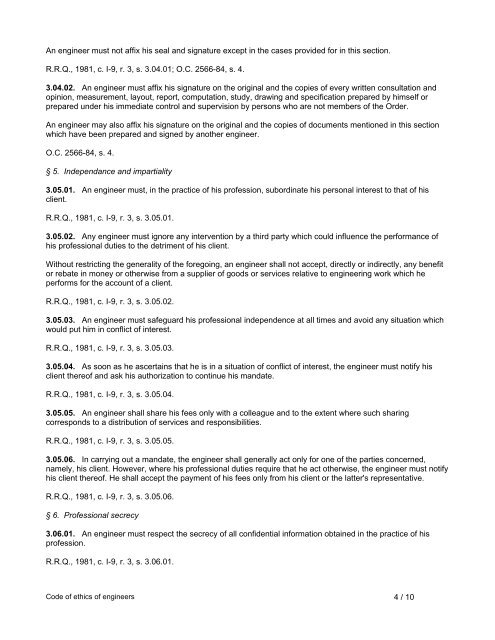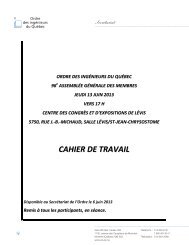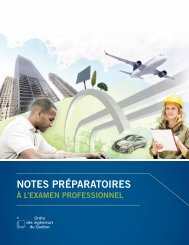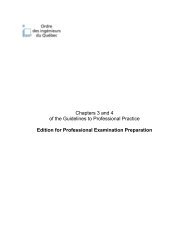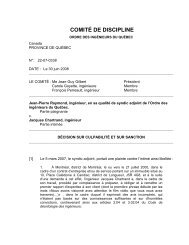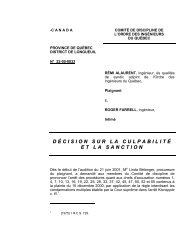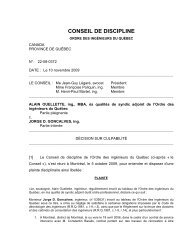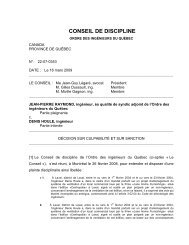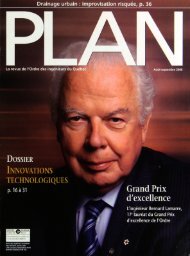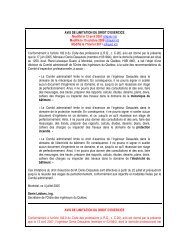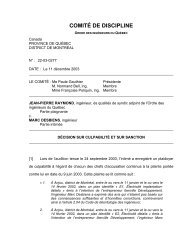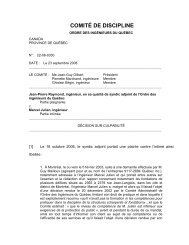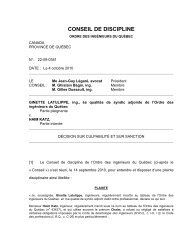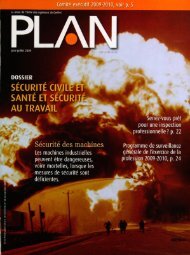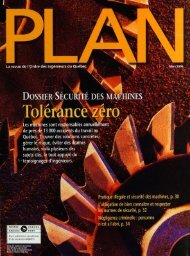Code of ethics of engineers - Ordre des ingénieurs du Québec
Code of ethics of engineers - Ordre des ingénieurs du Québec
Code of ethics of engineers - Ordre des ingénieurs du Québec
You also want an ePaper? Increase the reach of your titles
YUMPU automatically turns print PDFs into web optimized ePapers that Google loves.
An engineer must not affix his seal and signature except in the cases provided for in this section.<br />
R.R.Q., 1981, c. I-9, r. 3, s. 3.04.01; O.C. 2566-84, s. 4.<br />
3.04.02. An engineer must affix his signature on the original and the copies <strong>of</strong> every written consultation and<br />
opinion, measurement, layout, report, computation, study, drawing and specification prepared by himself or<br />
prepared under his immediate control and supervision by persons who are not members <strong>of</strong> the Order.<br />
An engineer may also affix his signature on the original and the copies <strong>of</strong> documents mentioned in this section<br />
which have been prepared and signed by another engineer.<br />
O.C. 2566-84, s. 4.<br />
§ 5. Independance and impartiality<br />
3.05.01. An engineer must, in the practice <strong>of</strong> his pr<strong>of</strong>ession, subordinate his personal interest to that <strong>of</strong> his<br />
client.<br />
R.R.Q., 1981, c. I-9, r. 3, s. 3.05.01.<br />
3.05.02. Any engineer must ignore any intervention by a third party which could influence the performance <strong>of</strong><br />
his pr<strong>of</strong>essional <strong>du</strong>ties to the detriment <strong>of</strong> his client.<br />
Without restricting the generality <strong>of</strong> the foregoing, an engineer shall not accept, directly or indirectly, any benefit<br />
or rebate in money or otherwise from a supplier <strong>of</strong> goods or services relative to engineering work which he<br />
performs for the account <strong>of</strong> a client.<br />
R.R.Q., 1981, c. I-9, r. 3, s. 3.05.02.<br />
3.05.03. An engineer must safeguard his pr<strong>of</strong>essional independence at all times and avoid any situation which<br />
would put him in conflict <strong>of</strong> interest.<br />
R.R.Q., 1981, c. I-9, r. 3, s. 3.05.03.<br />
3.05.04. As soon as he ascertains that he is in a situation <strong>of</strong> conflict <strong>of</strong> interest, the engineer must notify his<br />
client there<strong>of</strong> and ask his authorization to continue his mandate.<br />
R.R.Q., 1981, c. I-9, r. 3, s. 3.05.04.<br />
3.05.05. An engineer shall share his fees only with a colleague and to the extent where such sharing<br />
corresponds to a distribution <strong>of</strong> services and responsibilities.<br />
R.R.Q., 1981, c. I-9, r. 3, s. 3.05.05.<br />
3.05.06. In carrying out a mandate, the engineer shall generally act only for one <strong>of</strong> the parties concerned,<br />
namely, his client. However, where his pr<strong>of</strong>essional <strong>du</strong>ties require that he act otherwise, the engineer must notify<br />
his client there<strong>of</strong>. He shall accept the payment <strong>of</strong> his fees only from his client or the latter's representative.<br />
R.R.Q., 1981, c. I-9, r. 3, s. 3.05.06.<br />
§ 6. Pr<strong>of</strong>essional secrecy<br />
3.06.01. An engineer must respect the secrecy <strong>of</strong> all confidential information obtained in the practice <strong>of</strong> his<br />
pr<strong>of</strong>ession.<br />
R.R.Q., 1981, c. I-9, r. 3, s. 3.06.01.<br />
<strong>Code</strong> <strong>of</strong> <strong>ethics</strong> <strong>of</strong> <strong>engineers</strong> 4 / 10


